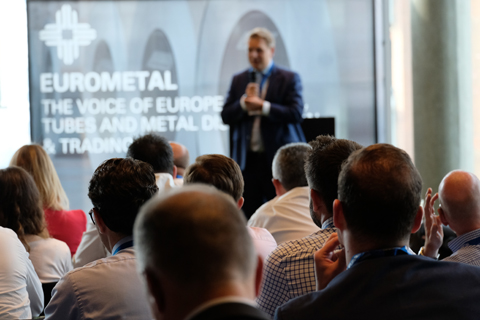Eurometal hosts Steel Net Forum & International Steel Trade Day
by David Fleschen

Eurometal Steel Net Forum & International Steel Trade Day, convened in Hamburg on 09 October, attracted professionals and stakeholders of the steel market. The event covered many aspects and highlights in the current situation of global steel trade and other market developments.
On the background of a global economic outlook, revised down by the newest IMF forecast, EU GDP growth is expected to go down from 2 % in 2018 to 1 % in 2019.
As a consequence, world steel consumption growth is expected to slow in 2019.
For EU a deceleration of the growth rate of apparent steel consumption is also expected during next year.
Colin Richardson from Argus Media underlined the impact on flat steel consumption of structural changes in the automotive industry, considering trends towards car sharing and light weight material use.
The deceleration of steel growth will happen amidst rising concerns about global trade wars, with steel trade flows in the heart of an accelerating move of anti-dumping/anti-subsidy and safeguard measures.
Matthew Watkins from CRU underlined the specific steel trade situations in China, Turkey and Russia and elsewhere.
Yuriy Rudyuk from Van Bael and Bellis introduced the audience to the complex mechanisms of WTO and EU trade legislation regarding anti-dumping, anti-subsidy and safeguard investigations and measures. Regarding coming definitive EU steel safeguard measures he hinted at eventual product narrowing and exemptions and a licensing system.
It was outlined during the meeting, that the core problem of excess world steel capacity is far from being tackled, even if the growth rate of world steel capacity has stalled in the last two years.
Facing turbulent steel times and disrupted steel trade flows, steel distribution, SSC and steel trade have to permanently adapt their strategies and tactics in order to protect their customer base by creating enhanced service offers and developing enhanced functionalities in order to help customers to increase added value.
A very animated debate highlighted the key success factors for steel distribution, SSC and steel trade: outstanding knowledge about the complete supply chain from producer to end user, product and service availability, being a partner to customers, customized logistics, management of Working Capital for customers, short lead times.
But also the new opportunities generated by Digitalization and Internet of Things are now generally considered as new tools in order to enhance the interface with customers and suppliers and to optimize warehousing, processing and logistics.
But enhancing value comes also with an additional cost in a way that Pricing for Value remains a key issue for the intermediating steel business.
The key topics in 2019 for steel distributors, SSC and traders were mentioned to be pricing for value, Digitalization, logistical capability, customer commitment, finance facilities, sourcing.
Regarding Digitalization, the conference listened to an outstanding presentation by Professor Hoberg from Kühne Logistics University on Industry 4.0, its 50 relevant technologies, on new data sourcing and new solution techniques available to create tailor made Industry 4.0 solutions for any business.
Customized steel logistics were at the heart of a presentation by Dirk Müller, from RKI Logistics, warning that presently steel freight market is unbalanced and will stay so in a longer future.
What will be the future role of independent and SME-sized steel distributors and traders?
This question was also discussed by the Hamburg conference and concluded that there will be always room in the steel market for independent and dynamic SME players finding market, service and product niches for customers and adapting to the everchanging steel environment.
Source: Eurometal, photo: fotalia

